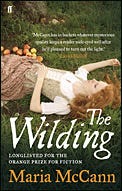For Jonathan Dymond, twenty-five years old in 1672, a "wilding" is a chance-grown apple tree, sprung from a seedling of unknown parentage. His greatest passion is making cider. "Certain smells seem old as Eden ... I loved the heady stink of fermentation - 'apples and a little rot', as the cottagers said - and the bright brown sweat that dripped from the murc even before the screw was turned, the generous spirit of the apple that made the best cider of all."
Jonathan loves and admires his parents, but his customary obedience falters after his father answers a mysterious summons and returns haggard. A sudden illness has carried off Jonathan's uncle before his father could reach the sickbed. Using the excuse of a mourning visit and the cider-making season to visit his newly widowed aunt in Tetton Green, Jonathan probes into the reason behind the summons. His curiosity mounts as he realizes his taciturn, unpleasant aunt is guarding secrets within secrets. A strangely undeferential servant girl with "the wedge face and lucent eyes of a fox" nursed his uncle and may know something, but she, too, is secretive. Jonathan's passion to uncover the truth soon overshadows his passion for cider-making. But each hard-won, partial answer leads to further and darker mysteries, the worst of which stretch back before Jonathan's birth, to the harrowing days of the Civil War, when the king's troops were quartered in Tetton Green.
The Wilding is a novel about moral questions, going beyond the easy condemnation of an act of supreme, horrifying cruelty to ask what responsibility lies with the well-intentioned people who sought to patch up the damage and keep it hidden. As the secrets begin to work their own damage, a new generation must make its way through the moral thicket. This novel fascinates from beginning to end and after the last page is turned. (2010; 335 pages)




